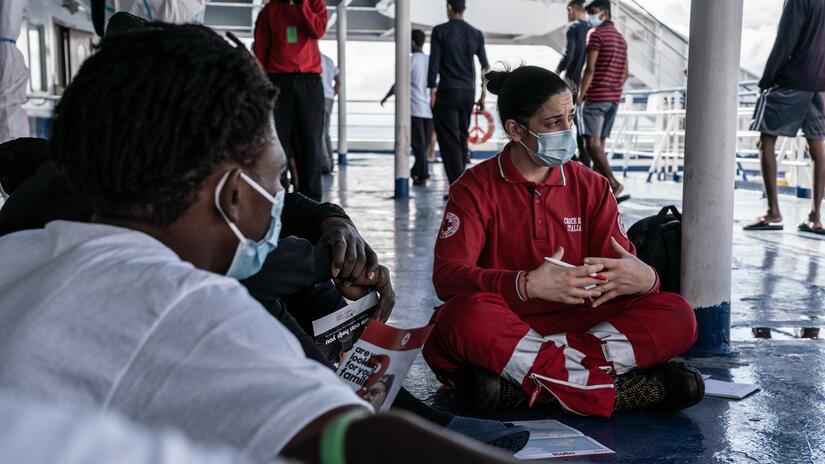Geneva, 10 September 2020 – The COVID-19 pandemic has been a disaster for people from all walks of life, but an absolute “catastrophe” for the world’s vulnerable migrants, people seeking asylum and refugees. Already weak social safety nets are eroding, migrants are being stuck, stranded without access to support, in some cases unable to move or return, as well as exposed to increasing risks of unwarranted deportation and detention, and heightening stigma and discrimination.
Speaking to journalists in Geneva, Francesco Rocca, the President of the International Federation of Red Cross and Red Crescent Societies (IFRC), said:
“COVID-19 has been cruel for all of us. It has been catastrophic for migrants. They face even more restrictions in terms of accessing basic services in ways that contribute nothing to public health. They are disproportionately impacted by border closures. They face heightened risk of detention and deportation. They are increasingly scapegoated for the pandemic.”
National Red Cross and Red Crescent Societies have seen a sharp increase in the vulnerability of migrants around the world. For example, in Central America, the closing of borders and the hardening of policies have seen thousands of migrants trapped at points along the isthmus, including in Darien Province in Panama, and on the Costa Rica side of the Nicaragua border.
In Europe, thousands of migrants remain stranded in Bosnia and Herzegovina, in large part due to COVID-19 restrictions. In Greece, appeals to move vulnerable migrants from inadequate facilities on islands to the mainland have also stalled, in part because of the pandemic.
IFRC President Rocca said:
“Border closures and lack of political will have trapped tens thousands of migrants in Europe, North Africa and the Americas in an intolerable limbo, often without access to critical support to meet their most basic needs and stay safe.”
In terms of economic impact, President Rocca warned that COVID-19 has caused “threadbare social safety nets for migrants and refugees to snap.” In Turkey for example, recent IFRC and Turkish Red Crescent polling has found that nearly seven out of 10 refugee families surveyed have lost employment while a staggering four out of five families have seen their household debts balloon to near intolerable levels.
Mr Rocca was speaking at the launch of a new IFRC policy report that looks specifically at the impact of COVID-19 on migrants and refugees. The report – Least protected, most affected: migrants and refugees facing extraordinary risks during the COVID-19 pandemic – documents the rising vulnerabilities of these groups over the past six months, while noting that the existing challenges faced by migrants have been exacerbated and risks to health and safety increased as a result of the pandemic.
The report contains a number of recommendations for governments on how COVID-19 responses can best keep everyone safe, including by ensuring the policies introduced to control the pandemic are not used to justify inhumane treatment of migrants and refugees.
President Rocca said:
“(These measures) must not impact the ability of people to seek asylum or force people to return to situations of danger and harm. In some countries, we have seen the principle of non-refoulement being discounted.
Stopping the virus is in everyone's interest: how each country treats and supports the most vulnerable will affect how the virus spreads and how well the country recovers from the pandemic.”
Download the report:
Least protected, most affected: migrants and refugees facing extraordinary risks during the COVID-19 pandemic (PDF, 5.7 MB)
Press release
IFRC concludes implementation of the ESSN programme in Türkiye
IFRC concludes implementation of the ESSN programme in Türkiye
| Press release

